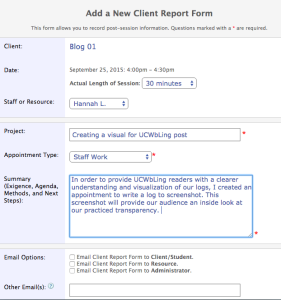Practicing Values in a Mission-Led Institution
At the UCWbL, we have 6 Core Values that inform all of our practices: Collaboration, Diversity, Reflection, Respect, Revision, and Transparency. It is our goal that those values will be reflected in everything we do here at the UCWbL. Recently, I got to thinking about how our Core Values of Transparency and Reflection are embodied in our procedure of writing logs.
What are Logs?
First, what are logs? At the Writing Center, logs are notes/records written by tutors after every appointment which document what happened in an appointment. Specifically, a log contains a summary of every appointment, made of the following components:
- Exigence: expresses the purpose of the appointment
- Agenda: a collaboratively established list of goals to achieve throughout the appointment
- Methods: the actual happenings and strategies used during the appointment to achieve the Agenda
- Next Steps: the consequential forward-looking plan to progress the project worked on during the appointment

A screenshot of our online log form at the UCWbL.
Why Do We Write Logs?
Though tutors may bemoan the tedium of this seemingly repetitive procedure, writing logs not only renders data that provides feedback to our Research Team to inform our practices, but logs are a genre that serves, and possibly will come to protect, the participants of an appointment.
For example, our logs provide proof that writers have come to the writing center, and they talk about what we worked on during those appointments so there can be no doubt that a writer was actually present for their appointment when the log for it is complete. Additionally, if a tutor’s methods or practices fall under question, the appointment log provides a clear and honest record of the goings-on in the appointment that all interested parties can refer to.
Detailed documentation of every appointment, therefore, establishes and maintains a body of credibility. Parallel to grocery store receipts, a poet’s journal, or data from a survey, a regularly-written record of what happens in appointments lends itself as evidence for a writer’s progress, a tutor’s methods, and more. For an academic professional organization, documenting our activity is not only good for building ethos within the community we serve, but also keeps tabs on what goes on within our walls.
To uphold our value of Transparency, we share the logs we write with the writers we had the appointment with, and we also offer the option to send that same log to the instructor that may have requested a report of the appointment. Furthermore, the content of these logs is reviewed by UCWbL administration and leadership to ensure we are measuring our progress and reflecting on our tutoring methods.
Due to the specific reflective and collaborative components of logs (exigence, agenda, methods, next steps) and the extended audience for our logs, this Writing Center procedure lends itself as a proactive practice to avoid unreported incidents that may signal potential discomfort or risk to someone’s wellbeing. This seems significant on a college campus, particularly in the interest of facilitating safe conversations for people from diverse beliefs and values.
Core Conclusions
Reflecting on and interrogating the purposes for our daily practices may inform other discourses on how the written word can become substantial reflections of our awesomeness, records of writers growing with our services, and a genre that practices transparency with our community. Like a lot of Core Values and Core Practices, the seemingly small things that we do everyday can create a positive impact on our lives!
Now that you have some UCWbL cores to consider, I’m going to log out! (Shout out to Theresa B. for that pun.) If you have any interesting log-writing stories, share them in the comments below!
Discover more from UCWbLing
Subscribe to get the latest posts sent to your email.

